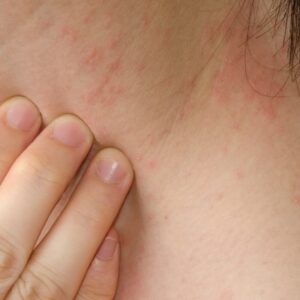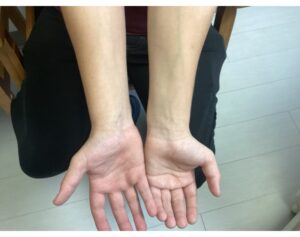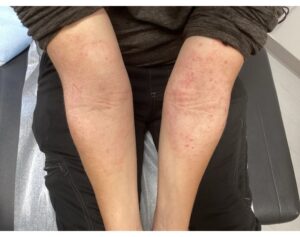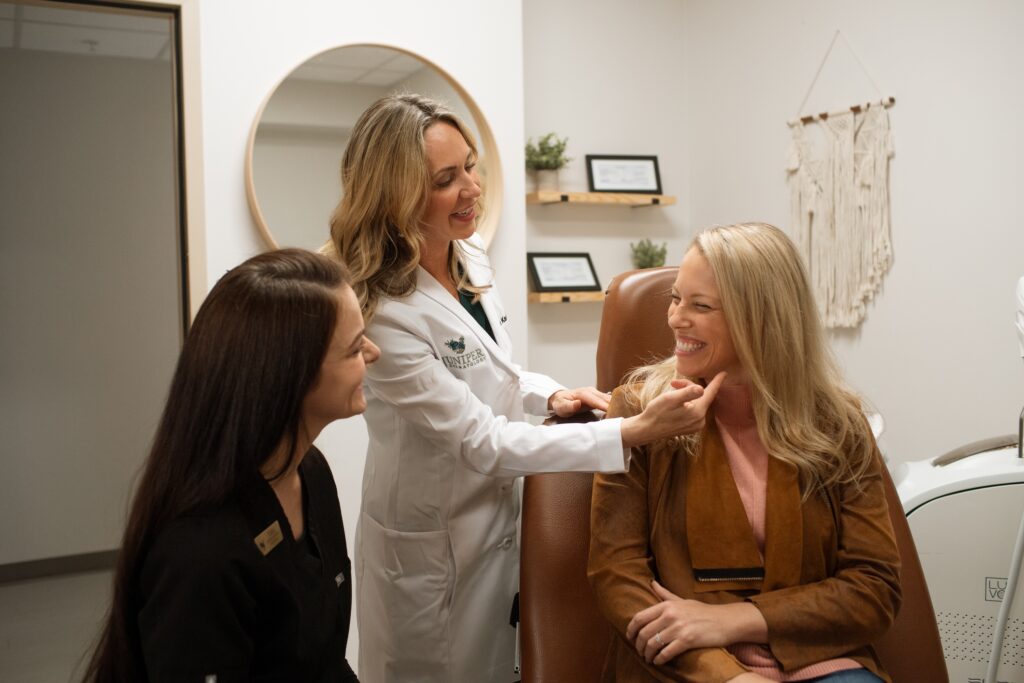- Skin Confusion: The Look-Alike Conditions
- Spot the Difference: Tell-Tale Signs
- The Trigger Game: What’s Setting Off Your Skin?
- Treatment Talk: Solutions for Happier Skin
- The Juniper Difference: Our Specialized Approach
Oh, honey, is your skin feeling a little rebellious lately? Maybe you’ve noticed some itchy patches that just won’t quit, or perhaps some flaky areas that have you second-guessing your moisturizer game. If you’re scratching your head (and maybe everywhere else) wondering whether you’re dealing with psoriasis or eczema, you’re not alone! These two skin conditions love playing tricks on us, often looking like twins at first glance. But don’t worry – we’re about to break down the differences so you can better understand what might be causing your skin’s little tantrum.
Skin Confusion: The Look-Alike Conditions
Let’s start with the basics, shall we? Both psoriasis and eczema are chronic skin conditions that cause inflammation, irritation, and discomfort. They can both make your skin feel dry, itchy, and generally unhappy. But despite these similarities, they’re actually quite different beneath the surface.
Psoriasis: The Overachiever
Psoriasis is like that overenthusiastic coworker who’s always doing too much, too fast. It’s an autoimmune condition where your immune system gets a little confused and tells your skin cells to grow way faster than they should – we’re talking days instead of weeks! These extra skin cells pile up on the surface, creating those characteristic thick, raised plaques with silvery-white scales.
Think of psoriasis as your skin on fast-forward – it’s producing new cells before it has a chance to shed the old ones. The result? Those distinctive thick, raised patches that can appear on your elbows, knees, scalp, and lower back.
Eczema: The Sensitive Soul
Eczema (particularly atopic dermatitis, its most common form) is more like your sensitive friend who gets upset at the slightest provocation. It’s an inflammatory condition where your skin barrier function isn’t working quite right, making your skin more vulnerable to irritants and allergens.
With eczema, your skin becomes inflamed, itchy, and can develop a rash that might ooze or crust over in more severe cases. Unlike psoriasis, eczema tends to feel intensely itchy – sometimes so itchy that it can disrupt your sleep and daily life. The itch-scratch cycle is real, folks!

Spot the Difference: Tell-Tale Signs
Still confused about which condition might be affecting your skin? Let’s look at some key differences that can help you and your dermatologist make the right call.
Location, Location, Location
One major clue is where these conditions typically show up on your body:
Psoriasis loves:
- Elbows and knees (the outer surfaces)
- Scalp
- Lower back
- Nails (can cause pitting and discoloration)
Eczema prefers:
- Inside of elbows and behind knees (those bendy areas)
- Neck and face
- Hands and wrists
- Ankles and feet
Think of it this way: psoriasis tends to appear on the “outside” surfaces of joints, while eczema likes to hide in the “inside” creases. Not always true, but a helpful hint!
The Look Test
Psoriasis typically appears as:
- Well-defined, thick, raised patches
- Covered with silvery-white scales
- Sometimes red or salmon-colored underneath
- Less itchy, but might burn or sting
Eczema usually shows up as:
- Reddish, inflamed areas with less defined borders
- Possibly with small bumps that might leak fluid
- Sometimes crusty or scaly, but not as thick as psoriasis
- VERY itchy (this is a major differentiator!)
The Age Factor
Another hint might be when your symptoms first appeared. Eczema often begins in childhood – many patients see symptoms before age 5, and some grow out of it as they get older (though not everyone is so lucky!). Psoriasis, on the other hand, typically makes its debut between ages 15-35, though it can appear at any age.
The Trigger Game: What’s Setting Off Your Skin?
Both conditions can come and go in “flares,” but their triggers might give you another clue about which one you’re experiencing.
Common psoriasis triggers include:
- Stress (isn’t it always?)
- Skin injuries or sunburns
- Certain medications
- Infections (especially strep throat)
- Cold, dry weather
- Alcohol consumption
Eczema might flare up because of:
- Irritants (soaps, detergents, fragrances)
- Allergens (dust mites, pet dander, pollen)
- Food allergies (in some people)
- Stress (sensing a pattern here?)
- Dry skin and weather changes
- Hormone fluctuations

Treatment Talk: Solutions for Happier Skin
Now for the good news – both conditions are treatable! While there’s no permanent cure for either psoriasis or eczema, we have plenty of options to help manage symptoms and reduce flare-ups.
For Psoriasis
At Juniper Dermatology, we offer several effective treatment options for psoriasis:
- Topical therapies: Prescription creams, ointments, and other products that reduce inflammation and promote skin cell turnover.
- Medications: Oral or injectable medications that regulate your immune system and control stubborn cases.
- Biologic drugs: Injectable biologics that provide long-lasting relief, even for moderate-to-severe cases.
- Pulse dye laser (VBeam): Our newest treatment option! This innovative laser targets the blood vessels in psoriasis plaques, reducing redness and inflammation. It’s particularly effective for psoriasis patches that haven’t responded well to other treatments.
- Combination therapies: For complex cases, we might recommend using 2 or more treatments together for optimal relief.

For Eczema
For our eczema warriors, we offer these effective treatments:
- Moisturizers and emollients: To strengthen your skin barrier and lock in hydration.
- Topical medications: Including corticosteroids and calcineurin inhibitors to reduce inflammation and itching.
- Oral medications: For more severe cases that don’t respond to topical treatments.
- Pulse dye laser (VBeam): This new treatment can also help with persistent eczema patches by targeting the inflamed blood vessels that contribute to redness and irritation.
- Phototherapy: Controlled exposure to specific wavelengths of light to reduce inflammation.
So there you have it, skin enthusiasts – the lowdown on psoriasis and eczema! Whether you’re dealing with the thick, scaly plaques of psoriasis or the intensely itchy patches of eczema, remember that you don’t have to face these skin challenges alone.
Remember, beautiful skin isn’t always perfect – but with the right treatment, it can definitely be comfortable and confident. Let’s get your glow back, shall we?


